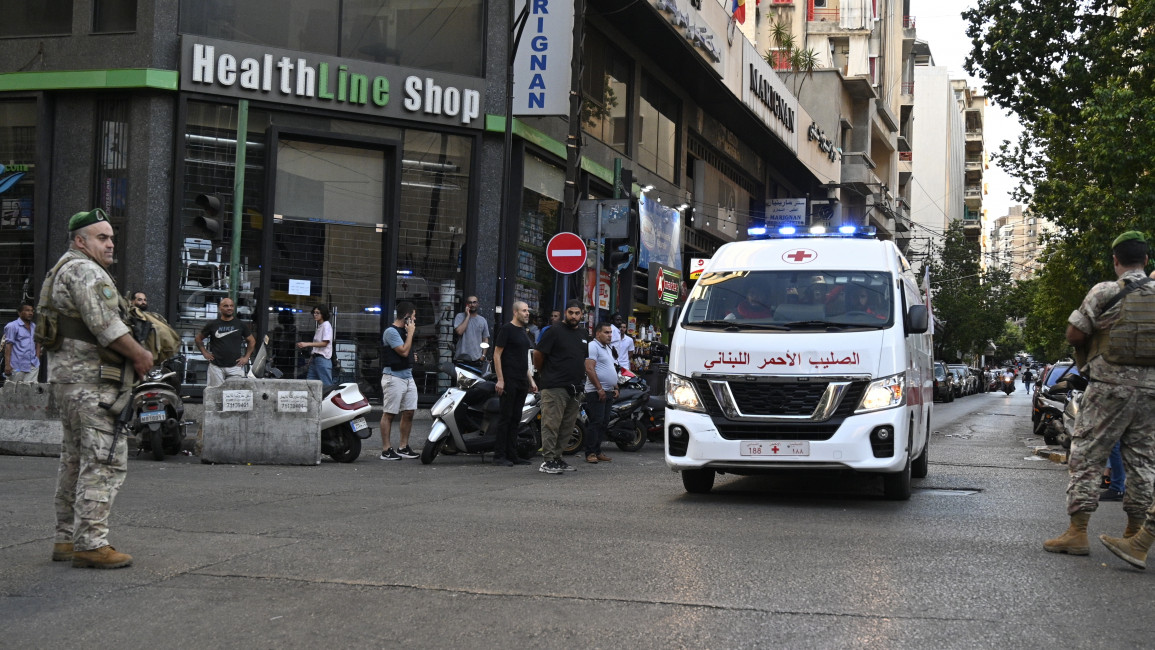Doctors treat eye injuries from Lebanon device explosions, wounded evacuated to Iran and Syria
Hundreds of people in Lebanon are believed to have suffered serious eye injuries in a major double-attack on telecommunications devices in the country, in an horrifying espionage operation widely blamed on Israel.
Nearly 3,000 people, mainly members of Hezbollah but including many civilians, were wounded when pagers exploded on Tuesday, with a second surprise attack on Wednesday causing hand-held devices to detonate, injuring hundreds more and causing carnage across Lebanon.
Medical workers across the country say that hospitals have been overwhelmed by the mass explosions that prompted the health ministry to activate its emergency protocol. Hospitals have been inundated with people suffering serious wounds to their hands, fingers and face, the health ministry said.
Lebanon’s Health Minister Dr Firass Abiad said that several victims were transported for treatment to hospitals in Iran and Syria, including the Iranian ambassador to Beirut who was hurt in the attack on Tuesday.
At a press conference in Beirut on Thursday, Abiad said that hospitals and health teams across the country had stepped up to the emergency, with the response being compared to August 2020 port explosion.
"There is a silver lining as we have seen the unity of our Lebanese people and the professionality of our doctors and nurses who lived up to their responsibilities," Abiad said.
Revealing details about the wounded, Abiad said there were many burn victims with injuries impacting "the ability of the wounded to breath".
He said the nature of the wounds suggest that many of the victims were holding the device after it rang for a few seconds and then exploded into people's hands and faces.
Some 460 people needed urgent surgery for injuries to the eyes, face or limbs. Several amputations had to be performed on wounded hands or fingers, the health ministry said.
Analysts have said that large number of injuries to Hezbollah members will have severely hampered the group's fighting capabilities and dealt a heavy psychological blow.
Several Arab and other MENA nations have offered Lebanon, which has been suffering from a dire economic crisis for years, support, with aid shipments arriving from Iraq on Wednesday, and more expected from Iran and Jordan.
Around 100 people were flown to Iran for eye surgeries, including Iranian ambassador Mojtaba Aman who reportedly lost eyesight in one eye and has severe injuries to the other.
Iranian state media reported on Thursday that Iran's foreign minister Abbas Araghchi visited Aman in hospital in Tehran, with doctors "confident" the diplomat could "return to work soon".
Hospitals in Syria also received wounded Lebanese from towns in the nearby Bekaa region. Abiad added that "92 percent of the cases will be treated in Lebanon".
Nine-year-old Fatima Abdullah from southern Lebanon was among the two children killed when she picked up her father’s pager after it beeped, according to interviews her family gave to the media.
Lebanese MP Elias Jarade has been among the surgeons urgently trying to save the sight in people with eye injuries. Dr Jarade, who is an independent MP and works at the Beirut Eye and ENT Specialist Hospital, said the past 24 hours have been a huge medical challenge.
"None of us have thought about taking a break because this is a historic moment that puts us in front of a great responsibility," he said to Lebanese news site Megaphone.
"I hope, just as the entire medical staff has proved its commitment to its national humanitarian duty, that all Lebanese people in this moment will do the same thing."
Ophthalmologist Dr Nabih Chamas said the situation had been tough, with the doctors attempting to stich eyes and save the sight of as many people as they can. He told Megaphone that the injuries were "concentrated around the eyes".
There are mounting fears that the telecommunications attack has paved the way for Israel to launch a major invasion of the country's south, which has been in the midst of crossfire between Hezbollah and Israeli forces since October.
The international community has called for restraint in the region as Lebanon's caretaker Prime Minister Najib Mikati held meetings on Wednesday with the government's disaster risk management committee in case of a greater escalation with Israel.




 Follow the Middle East's top stories in English at The New Arab on Google News
Follow the Middle East's top stories in English at The New Arab on Google News
![A group of Palestinians, foreign and Israeli activists gather to participated in an olive picking event on the land in the town of Battir, which is under threat of confiscation by Israel in Bethlehem, occupied West Bank on 8 November 2024. [Getty]](/sites/default/files/styles/image_330x185/public/2182930803.jpeg?h=199d8c1f&itok=__0LgGsa)

![People gathered around the rubble of destroyed houses to search for survivors [Getty]](/sites/default/files/styles/image_330x185/public/2024-11/GettyImages-2184733820.jpg?h=199d8c1f&itok=NiM1LO2f)